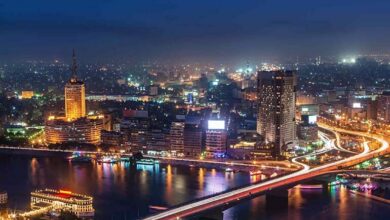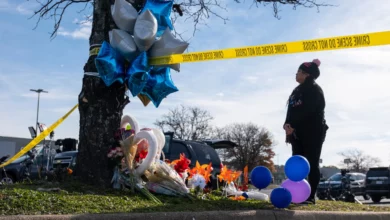The call for protests on January 25 was specifically meant to coincide with National Police Day. Behind it was a long list of grievances concerning police brutality toward civilians, which did not normally get the requisite national attention until the death of Alexandrian Khaled Saeed, whose memory is celebrated today across the nation.
After an enforced hiatus, police have returned to the streets, and correspondingly there have been fresh accusations of transgressions against civilians. Protesters massed outside the Azbakiya police station on 3 June when a bus driver was killed after an altercation with the station’s most senior officer.
Another case that casts doubt on the propriety of recent police behavior occurred in Omraneya on 18 May, also as a result of an altercation between a civilian and a police officer. Mahmoud Sobhy Hussain, 26, was shot and injured by Captain Eissa al-Sayed Rashed, 38, of the Giza Traffic Authority in the Nasr al-Din neighborhood.
Rashed had decided to impound the tuk tuk (three-wheeled vehicles ubiquitous in many of Cairo’s lower income neighborhoods) that belonged to Mahmoud Hussain’s brother, Hassan. He was not carrying the vehicle’s registration so called his brother to bring it, along with LE200 that the defendant’s family allege was the fine Rashed issued to stop the tuk tuk from being impounded.
Emad Mahmoud, a witness, said that when Mahmoud asked for the tuk tuk to be removed from the tow truck, the officer refused and insulted him. Eventually Mahmoud responded in kind and the officer pulled his gun out and shot twice in the air.
“Mahmoud didn’t budge and said he wouldn’t leave without the tuk tuk,” he continued. “The officer told him his life wasn’t worth a quarter of a pound, and Mahmoud turned his back and said that he couldn’t hit him. He heard the cocking of the pistol and as he was turning back around to face him the officer shot Mahmoud.”
What happened next differs according to the defendants' account and an official version published on Facebook by the Interior Ministry, which is charging Mahmoud, Hassan, Ahmed Abdel Azim, 18, and Attiya al-Sayid Mohamed, 38, and others with assaulting an officer with a deadly weapon, carrying illegal weapons and armed robbery.
Lawyer Malek Adly from the Hisham Mubarak Law Center submitted a complaint to the Public Prosecutor on behalf of Mahmoud’s wife, Samar Mohamed Abul Magd, against Rashed as well as the Um al-Masriyeen Hospital where Mahmoud was treated and the Omraneya prosecutor for an array of violations, including a miscarriage of the investigative process.
On 2 June, Adly went to the South Giza Court to submit the complaint after the case had been referred to that jurisdiction by the Public Prosecutor’s office. The South Giza prosecutor refused to meet him or receive the complaint, sending him a message through his secretary that if it was deemed necessary to open an investigation, he would be sent for and the necessary paperwork requested.
Lawyer and activist Noov Senary, who was present at the time, said, “In any case an investigation must be opened. In that investigation the prosecution can make its claims – that [Mahmoud Hussain] is a thug or whatever else. The problem is that he (the South Giza prosecutor) doesn’t want to start one. It seems nothing has changed [since before the revolution].”
On 4 June, Mahmoud and the three other defendants were remanded in custody for a further 15 days. Mahmoud had been transferred from hospital to the Giza police station on 30 May and has returned at least once to have his wounds redressed.
Adly maintains that Mahmoud was handcuffed during visiting hours and had his statement taken by the police less than an hour after leaving the operating room, while still groggy from an anesthetic.
The Interior Ministry's account of the incident, released on Facebook, said that Hassan had called his brother and the two others to accost Rashed after he had impounded the tuk tuk. Mahmoud verbally abused him and Rashed asked them to leave.
Mahmoud then allegedly attempted to attack Rashed with an unspecified weapon while the others tried to retrieve the tuk tuk. Again Rashed warned them but they attempted to flee with the tuk tuk so he fired two shots in the air. Again Mahmoud tried to attack him so Rashed shot him in the leg. Rashed also has witnesses that are backing his version of events.
Comments left on the ministry’s Facebook statement seem to be split between belief and disbelief.
Some lauded Rashed for his courage in the face of “thugs”. One said, “Ministry of Interior, manners should not be to the extent it is with dogs like these, there must be a distinction.” Another wrote “By God the officer is mistaken, he should have shot him in the head.” A third wrote, “Any officer who meets a thug who doesn’t obey him must shoot to kill with live ammunition so we can be relieved of these dirty useless types.”
But others were more circumspect. “Can you hear the case from the other side?” asked one, while another recounted the defendants' version and said he didn’t believe the Interior Ministry.
Article 102 of the Police Authority Law regulates the use of firearms by a policeman in the line of duty and states it should be a last resort. It says that use is limited to three instances: when someone wanted for a felony or any crime with a sentence over three months resists arrest when there is a warrant issued; during the guarding of prisoners; and to break up a gathering of five or more people who are endangering public security.
Adly said that none of these instances applied in this case, and therefore the officer's use of a firearm was not sanctioned.
Lingering challenges
There have been five reported cases of torture and police brutality recently. That throws into sharp relief the post-Mubarak relationship between police and civilians and throws into question whether there has been substantive change.
The assumption that there would be deep-rooted change seems to have been wishful thinking, according to Aida Seif El-Dawla from El Nadeem Center for Rehabilitation of Victims of Violence, who said that torture never stopped, even during the 18 days of protests that culminated in the ouster of the president.
“During the revolution, torture was being conducted by the military police and the army in the Egyptian museum and other places and now the police are back, and it is the same police force as before 25 January,” she said.
Dawla contended that the police know no other method besides the one they have followed for the past three decades, so they were therefore unequipped to handle the population in a less demeaning – and non-fatal – manner.
This approach extends beyond dealings with the police to obstacles in the legal system faced by lawyers working on these cases.
And while cases involving allegations of police brutality may not have been dramatically reduced by the 25 January revolution, Dawla felt that some things have irrevocably changed.
“People now have more power to counter incidents like these. They will not accept it and remain silent like they used to,” she said.




